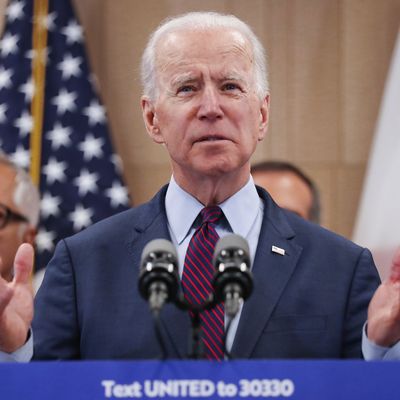
Zombielike, Joe Biden has revived his campaign. The former vice-president confirmed that he’s once again the primary’s front-runner on Tuesday, after vanquishing Bernie Sanders in states the senator desperately needed to win. There are many votes yet to count and debates yet to occur, but the math doesn’t favor Sanders’s odds. How did Biden surge back into prominence, and what does his showing mean for his party? Biden’s revival has almost nothing to do with his actual merits as a candidate — and that’s a sign his party is in deep turmoil.
Biden, as everyone knows by now, owes his success to older voters. Women and older black voters in particular heavily favor him over Sanders, who pulls much of his support from voters under 45. The age gap is stark, and it tells us something about the specific qualities of Biden’s appeal. For two very different generations of voters, Biden and Sanders represent distinct definitions of security. To younger voters, Sanders is a future they can tolerate. To older voters, Biden offers both protection and a return to values Trump destroyed.
Joementum exists, then, because of fear and nostalgia. Voters rightly fear the prospect of a second Trump term, and nostalgia tells them a familiar face can ward off evil. Biden is winning in states without any real effort; while Sanders still has to pitch voters, Barack Obama’s second-in-command has less explaining to do. Biden isn’t campaigning on policy, but on the power of his name. It’s working for now, but Democrats can’t expect to repeat the trick in the future.
The difference between Biden’s base and the one assembled by Sanders isn’t the only gap worth exploring. Despite his role as Obama’s former vice-president, Biden has failed to rebuild the coalition that famously helped his old boss defeat Hillary Clinton in 2008. Biden’s multiracial coalition only really exists among voters who are nearing or past retirement age; Obama conquered young primary voters. The limitation of Biden’s coalition may have a lot do with the tenor of his campaign; he isn’t calling for hope and change but a return to normal. Even if that’s enough to defeat Trump — and that possibility is less likely than Biden’s party backers seem ready to admit — it isn’t enough to unite his fractured party. The Biden message is ultimately a discordant one, out of sync with what draws most voters to liberal causes at all.
Fear and nostalgia are potent political forces. The Republican Party deploys both to its advantage. Its base distrusts change and longs for an American past during which they were preeminent. The party’s position on social issues like abortion, its opposition to more open immigration policies, and its refusal to expand the welfare state by even minor margins all stem from the same revanchist impulse. But these emotions aren’t reliable ways to win over liberals. Even the most milquetoast centrists tend to agree that abortion should stay legal, that the Civil Rights Act of 1964 was necessary, and that climate change is not only true but merits some expansion of government in response. Liberalism breaks with some elements of the past. It has to: Its adherents believe they march inexorably toward better times. They lack the purifying ambitions of the right wing or the transformative anti-capitalism of socialists, but they concede some incremental change must occur.
In temperament, Biden’s campaign resembles Clinton’s circa 2016, and is much further to the right of Obama’s successful 2008 run. His appeal thus isn’t liberal in character; it is fundamentally conservative, and Trump is the only reason it stands a chance of success. Democrats will have to prioritize a more substantive, values-based message if they want to weaken the GOP instead of holding it at bay. A liberal-ish party that has nothing to offer anyone but fear, and no promise to give but a return to the past is one that is ultimately doomed to fail. Democrats can never be the party of nostalgia; the lane is already occupied.
If the party is to embody its claim to be an engine of progress, it’ll have to pay close attention to the candidate its leaders mostly eject. Biden may have won all but one state primary on Tuesday, but a majority of voters in each state said they supported Medicare for All — a signature Sanders issue that Biden does not support. Biden’s resurgence isn’t proof on its own that voters have rejected the left. The case for his electability exists in part due to his centrism, but the dominant theme of his campaign has more to do with fame and familiarity.
Young voters, meanwhile, remain desperate for change. Time won’t weaken their commitment to social democracy, if not to socialism itself. Climate change guarantees their consistency. Party elders can’t dismiss them forever.






























